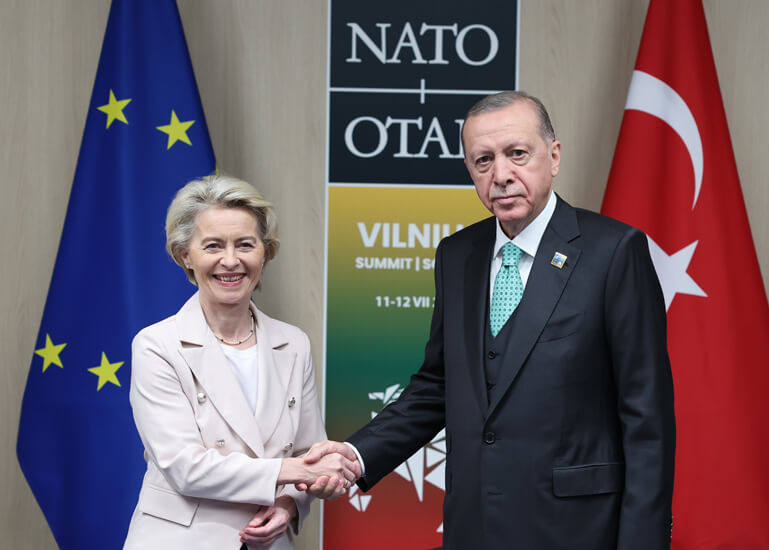The participation of Turkish foreign minister Hakan Fidan in the informal meeting of EU foreign ministers in Brussels marked the thawing of the institutional dialogue and the possible return of the EU and Turkey to the track of Turkish accession to the bloc.
Five years have gone since the chiefs of Turkish and European diplomacy met, and Minister Fidan's arrival in Brussels is a clear indication that the gap has been repaired.
The EU and Turkey have a long history of accession talks, dating back to 1987, when Ankara applied for membership. The accession negotiations started in 2005, but without much progress due to the complex nature of their relationship, marked by ups and downs.
Minister Fidan's two-hour working lunch with EU ministers and a series of one-on-one meetings in Brussels came a year after Turkish President Recep Tayyip Erdoğan's somewhat surprising return to the topic of Turkey's EU accession.
In the now-forgotten tension over Turkey's "yes" to Sweden's membership in NATO, Erdoğan requested the re-opening of Turkey's accession talks with the EU in July last year as one of the conditions.
The EU—a priority of Turkish diplomacy
This intervention by the Turkish president has shaken up the deadlocked process between Turkey and the EU. In 2019, the EU imposed certain sanctions on Turkey due to the dispute over gas exploitation in the Cyprus zone, which froze the process.
For a year, Turkish diplomacy has prioritised the renewal of dialogue with the EU, with the aim of resuming accession negotiations
For a year, Turkish diplomacy has prioritised the renewal of dialogue with the EU, with the aim of resuming accession negotiations. Hakan Fidan said in March of last year that Turkey's EU membership process was "too important to be left to the narrow political agendas of some countries."
Turkey's EU candidacy was a significant topic of conversation between the head of Turkish diplomacy and European colleagues in Brussels, confirmed Josep Borrell, the outgoing High Representative of the Union for Foreign Affairs and Security Policy. He specified, however, that "there was no formal request" from Turkey to restart accession negotiations.
If the European ministers had received such a request, they would likely have viewed it as premature, given that Ankara also wants to secure tangible benefits from the EU before the eventual formal continuation of accession negotiations.
Visa liberalisation
First of all, Turkey is interested in cancelling visas for its citizens to travel to the EU. This dialogue has been ongoing for a long time; it started at the end of 2013, with the conclusion of the agreement between Turkey and the EU on readmission, and now, according to the procedure, it is almost over.
Hakan Fidan said in Brussels that Turkey has already fulfilled 66 out of a total of 72 criteria for visa liberalisation and that the institutions are working on fulfilling the remaining six.
"Until visa liberalisation is achieved, we continue to work to eliminate the difficulties and obstacles our citizens experience during the Schengen visa application process. We continue our contacts with the EU and member states to expand multiple-entry and long-term visas," said Fidan.
Both Turkey and the EU have clearly made an effort not to bypass the Cyprus issue as one of the biggest obstacles in relations
Turkey also insists on modernising the custom union it has had with the EU since the 1990s in order to adapt to changed economic and trade trends.
On the other hand, the EU also has a lot of interest in ending the five-year high-level dialogue standstill with Turkey. Individual members will undoubtedly oppose this thaw, particularly because of the Cyprus issue and Turkey's human rights situation, which have historically been the two biggest political obstacles expressed by the EU.
After the meeting in Brussels, Josep Borrell confirmed the announcements that the issue of Cyprus will be at the top of the agenda of the talks between the Turkish and EU foreign ministers. However, he specified that the discussion was on a basic level, without going into details from earlier proposals.
Both Turkey and the EU have clearly made an effort not to bypass the Cyprus issue as one of the biggest obstacles in relations, but not to allow it to block discussions on a whole range of other, mutually significant topics.
New circumstances unfroze the EU-Turkey dialogue
The past five years, when Turkey and the EU did not maintain continuous and systematic diplomatic communication at a high level, brought enormous changes in the area of shared interests—from Ukraine to the Middle East.
In this respect, both Brussels and Ankara have made an effort to repair relations, to the extent that would be beneficial for both in the resolution of crisis points in their environment.
 The EU needs Turkey as a partner to implement its policy in relation to the Ukrainian crisis, as well as in the Middle East and the Caucasus
The EU needs Turkey as a partner to implement its policy in relation to the Ukrainian crisis, as well as in the Middle East and the Caucasus
NATO facilitates almost all EU members' cooperation with Turkey in the security format, but the EU needs Turkey as a partner to implement its policy in relation to the Ukrainian crisis, as well as in the Middle East and the Caucasus.
Hence, the reactivation of the Turkish-European dialogue is the result of new circumstances in which both sides realised that there were fewer obstacles in their relations than shared interests.
After breaking the five-year ice, both the EU and Turkey are now in a position where they can make bilateral concessions to each other, thereby moving towards a long list of shared interests.